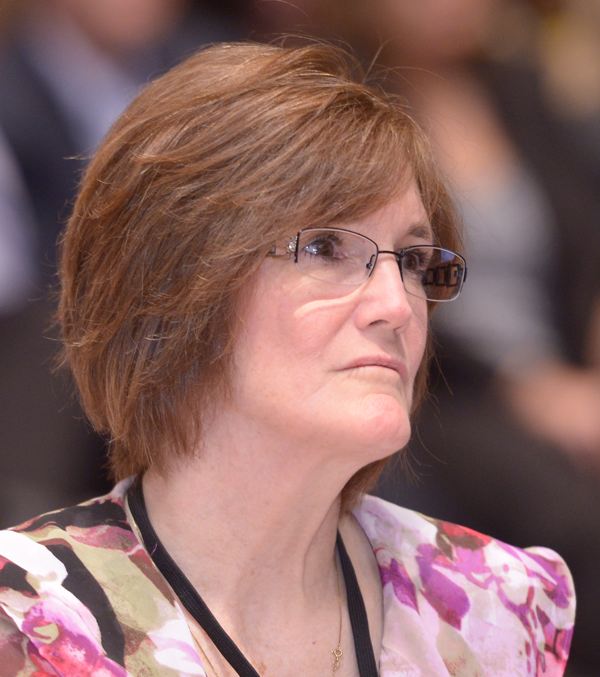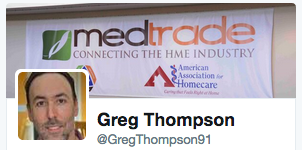DULUTH, MN – Any foray into HME journalism eventually requires a spelling lesson, particularly when it comes to the last name of “Schafhauser.” As executive director of the Midwest Association of Medical Equipment Services (MAMES), Rose Schafhauser (pictured) has seen the evolution of the industry over the last two decades.
Along with husband Jim Schafhauser, who takes care of the administrative side of things, Rose is responsible for Iowa, Kansas, Minnesota, Missouri, Nebraska, North Dakota, South Dakota, and Wisconsin under MAMES. With South West Medical Equipment Services Association (SWMESA), she covers Arizona and New Mexico.
 From their home office in Duluth, Minn., the Schafhausers preside over these 10 states with a mission that varies depending on the latest challenges. Like so many over the last five months, Rose and Jim have seen changes in the scope of their work. They are normally tasked with finding answers on behalf of members, and they’ve been doing that in recent months during a time when questions are more numerous than ever.
From their home office in Duluth, Minn., the Schafhausers preside over these 10 states with a mission that varies depending on the latest challenges. Like so many over the last five months, Rose and Jim have seen changes in the scope of their work. They are normally tasked with finding answers on behalf of members, and they’ve been doing that in recent months during a time when questions are more numerous than ever.
Rose and Jim recently made the difficult decision to cancel the in-person MAMES conference, originally scheduled for Oct. 6-9, in favor of a virtual event. Medtrade Monday sat down with them to learn more about the decision, as well as to get a sense of what they predict the industry may look like in the future.
Medtrade Monday: How tough was it to cancel the MAMES conference and go virtual?
Rose Schafhauser: Jim had the foresight from the beginning of the pandemic that it was going to impact our event, and I was confident that he was crazy. He ended up turning out to be right, because he even predicted in early spring that it was going to have an impact.
Jim Schafhauser: Obviously, the most important factor is the safety of our members and the safety of the people they serve as healthcare providers once they leave those facilities. But it also boils down to the fact that so many, whether they are hospital systems or manufacturers and service providers, the travel bans have extended into September, October—some all the way through the end of the year.
The reality for us, especially with eight states, and the differences in the handling of the pandemic from state to state—it just left so much uncertainty that it needed to be cancelled. When we did talk to the hotel in Minnesota, the hotel could not meet the guidelines of Minnesota for social distancing.
Medtrade Monday: How long have you both been at this in the HME world?
Rose: I actually came from the Medicare world right out of college, and then got recruited out of college into DME. I worked in the DME industry and worked my way up from the only billing person to a general manager of a $17 million dollar, four-location medical equipment company in St. Paul, Minn. At the end of 1999, I had a change of jobs and decided that I wanted to start my own company. I started an association management business, and that just happened to be when the Minnesota Association was changing their executive director and I got a contract literally within days.
I also found out that the Midwest Association was looking for an executive director, and then I was able to get that contract as well—so I’ve been in the association management world for 21 years. We also have contracts with the Medicare Jurisdiction Council for A, B and C. And then we also have the contract for the national supplier clearing house advisory committee. That is in addition to our HME associations.
Medtrade Monday: Where did you go to college?
Rose: I went to college at Winona State University and my degree was in Business Administration. However, I never graduated because I was paying for college out of my own pocket. I was number five out of six children, so I had to pay for it all myself, and pretty much ran out of money. I completed through the beginning of my junior year and had to leave.
Medtrade Monday: What has your working life been like lately?
Rose: Upside down is the best term. When everything started to change, we had to make the decision to cancel our spring event. As sad as I was about not being able to see everybody, I was happy that we wouldn’t have 24-hour days and two weeks straight of preparing for the spring convention. I thought it would give me time to really attack that to-do list. I think Jim had some great ideas of things he was going to do and absolutely none of that happened. It literally was like a tornado came through. In the 21 years of operating this business, I have never been busier in my entire life than I have been since March of 2020.
Medtrade Monday: What was taking up most of your time?
Rose: It’s the whole question of what does this all mean for us? Obviously, companies on a dime were having to move people to the home and work from home. You had all these billing issues. And then for us, it’s just to educate about what is happening. Literally when this first happened we had all these webinars of what it means and what this new environment is.
I found myself literally living in meetings, living on conference calls and Zoom meetings—not only from the industry side of things, but also on the meeting side of things. I was participating in industry meetings about the impact of COVID-19 and what it’s doing to the meeting industry. We were talking about best practices and keeping your members engaged during a pandemic. Working through the Medicare council we had a billion and one questions being thrown at us, and we actually put out a special call for questions from all four jurisdictions of what are the main issues or pain points that need to be answered. We were constantly in communication with them, compiling questions for them. It just was trying to figure out how to get all the answers when really so many answers didn’t exist.
Medtrade Monday: Were you hearing about a lot of layoffs among your members?
Rose: Not initially. There were a few of our members who did furlough a few staff, but for the most part, I was hearing that a lot of them were being repurposed. Members were being extremely creative with being able to keep those folks employed. So overall, I think if anything we’ve been hearing about layoffs in some of the hospital-based companies. There have been some changes out there, but not a ton. For the most part, members are reporting to us that they’ve adapted. Is it different? Absolutely. We have our retail committee, and some have been very creative on the retail side, and some have been very successful.
Medtrade Monday: Do you agree with the desire to postpone round 2021 of competitive bidding?
Rose: There’s some that agree and some that disagree. I think for the most part, when you peel back the onion, bottom line is it’s all about access for the Medicare beneficiary—access to our services. There’s the back and forth that, you know, I bid what I bid because I was going to get all that business and take away some of the business from my competitors. But when you sit down and you look at the issues related to competitive bidding, who is going to be hurt the most? Should it go through? It’s got to be the Medicare beneficiary. It’s a business first and foremost, yes, but I think if everybody took a look in the mirror, they would determine the delay is the right thing to do.
 Medtrade Monday: What do you say to people who might be on the fence about joining a state association?
Medtrade Monday: What do you say to people who might be on the fence about joining a state association?
Rose: Because we’re such a small industry, it’s imperative that we work together on these issues and I’ll just use Minnesota for an example. No other entity outside of MAMES really had any skin in the game in fighting the Minnesota incontinence program that was supposed to take effect actually last year, and so we rallied the troops together and partnered with a consumer organization and we sued the state. No company could have ever really been able to do that all by themselves. I just look at what we got accomplished by working together, by networking with another local community consumer organization. We really did a fantastic job. What is imperative for these folks who aren’t engaged, who don’t have skin in the game, they need to realize that they don’t have a voice. They don’t have a say. You can’t do it alone without the resources of someone like your local state association.
Medtrade Monday: What is the relevance of face-to-face in person trade shows nowadays?
Rose: It’s all about sitting at a table, working on an issue, and having everybody contribute to that conversation so that we can come up with best practices. The side bar conversations—the informal nature of that, it really creates a lot of good will. I look at some of our members who have been coming to shows for years, and they are from different states. It just makes my heart explode because they’ve established that relationship, they’ve established that friendship. You don’t get that from a Zoom meeting.
We had our state leaders call today. A lot of us were on Zoom face to face, and we had some laughs, giggles, that kind of thing, but it’s still not the same as being able to be in the room with those folks and raise a glass and salute them during this crazy year. You just can’t replace that. I think that the value you get from face-to-face meetings is about that relationship you establish. When you talk about the education that we do, they are educating themselves and we’re just being the bus driver to get you all together. You guys do all the communication and you guys come out with the product.
Medtrade Monday: Are you working on anything in particular that you want people to know?
Rose: I would say that just because we’re switching to this virtual platform, and we’re going to be making a significant cash outlay, we’re looking to collaborate with other state associations to have an opportunity to work together. Again, show the industry how important it is to belong to state associations. We’re really going to be looking to our partners.



